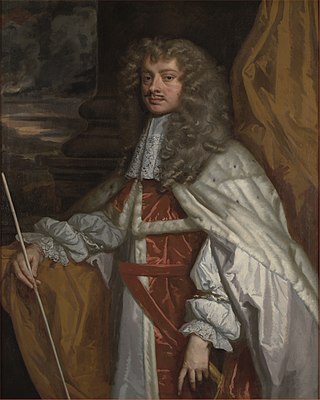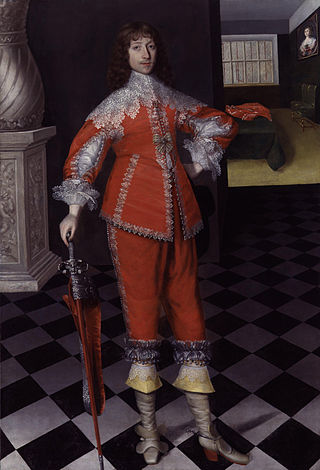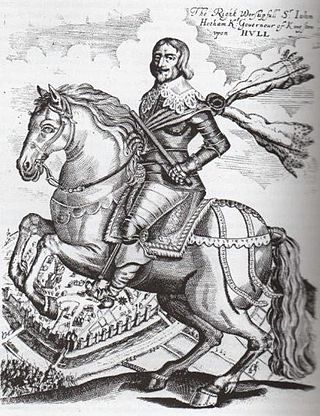Related Research Articles

Thomas Clifford, 1st Baron Clifford of Chudleigh was an English statesman who sat in the House of Commons from 1660 to 1672 when he was created Baron Clifford. He was one of five leading politicians who formed the Cabal ministry between 1668 and 1674 in the reign of Charles II.

John Belasyse, 1st Baron Belasyse was an English nobleman, Royalist officer and Member of Parliament, notable for his role during and after the Civil War. He suffered a long spell of imprisonment during the Popish Plot, although he was never brought to trial. From 1671 until his death he lived in Whitton, near Twickenham in Middlesex. Samuel Pepys was impressed by his collection of paintings, which has long since disappeared.
This is a list of people who have served as Lord Lieutenant for the East Riding of Yorkshire. The office was established after the English Restoration in 1660, when a Lord Lieutenant was appointed for each Riding of Yorkshire. Since 1721, all Lord Lieutenants have also been Custos Rotulorum of the East Riding of Yorkshire, and for part of the period also Lieutenants of the Town and County of the Town of Kingston upon Hull. It was abolished on 31 March 1974 with the creation of the county of Humberside, but was re-created upon the abolition of Humberside on 1 April 1996.
The post of Lord Lieutenant of the North Riding of Yorkshire was created in 1660, at the Restoration. It was abolished on 31 March 1974, and replaced with the office of Lord Lieutenant of North Yorkshire. From 1782 until 1974, all Lords Lieutenant were also Custos Rotulorum of the North Riding of Yorkshire.
This is a list of people who have served as Custos Rotulorum of the North Riding of Yorkshire.
Sir Conyers Darcy or Darcey,, of Aske, near Richmond, Yorkshire, was a British Army officer, courtier and Whig politician who sat in the House of Commons between 1707 and 1758.

The Sheriff is the oldest secular office under the Crown. Formerly the Sheriff was the principal law enforcement officer in the county but over the centuries most of the responsibilities associated with the post have been transferred elsewhere or are now defunct, so that its functions are now largely ceremonial.

Conyers Darcy, 1st Earl of Holderness was a British noble; created Earl of Holderness in 1682.
Conyers Darcy, 1st Baron Darcy of Meinhill, 7th Baron Darcy de Knayth and 4th Baron Conyers was a British noble and father of the 1st Earl of Holderness.

Sir Marmaduke Wyvill, 1st Baronet (1542–1617) was an English politician. He was a Member of Parliament for Richmond in 1584 and again in 1598 and the first of the Wyvill baronets. He was the first MP for Richmond and resided at Constable Burton Hall.
Sir Gilbert Gerard, 1st Baronet of Fiskerton was an English soldier and politician. During the English Civil War he supported the Royalist cause. After the Restoration he sat in the House of Commons from 1661 to 1685.
Sir Christopher Wyvill, 3rd Baronet was an English politician who sat in the House of Commons in 1659 and 1660.
Sir Thomas Ingram was an English politician who sat in the House of Commons in two periods between 1640 and 1672. He supported the Royalist cause in the English Civil War.
John Frescheville, 1st Baron Frescheville was an English soldier, landowner and politician who sat in the House of Commons at various times between 1628 and 1665 when he was created a peer and then sat in the House of Lords.

Sir Henry Belasyse, 1st Baronet (1555–1624) was an English politician.
Sir Henry Belasyse KB was an English army officer and Member of the Parliament of England. He was killed in a duel after a trivial quarrel with a friend, a tragedy which gave rise to much public comment.
Maurice Berkeley, 3rd Viscount Fitzhardinge, known as Sir Maurice Berkeley, Bt from 1660 to 1668, was an English politician, of the Bruton branch of the Berkeley family.
Marmaduke is a masculine given name. A historical reference is found an American genealogy book where the author, Isaac Newton Earle, references his relative named Marmaduke: "The name Marmaduke is from the Anglo-Saxon and means “a mighty noble”." Also, the author highlights that it is a very unusual name. In England the name is mentioned as being used in Yorkshire, but of probable Gaelic origin. As an Irish name, Marmaduke is interpreted as: Máel Máedóc, meaning "follower of Saint Máedóc".